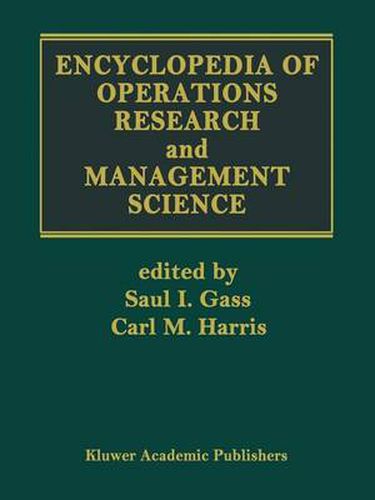Readings Newsletter
Become a Readings Member to make your shopping experience even easier.
Sign in or sign up for free!
You’re not far away from qualifying for FREE standard shipping within Australia
You’ve qualified for FREE standard shipping within Australia
The cart is loading…






This title is printed to order. This book may have been self-published. If so, we cannot guarantee the quality of the content. In the main most books will have gone through the editing process however some may not. We therefore suggest that you be aware of this before ordering this book. If in doubt check either the author or publisher’s details as we are unable to accept any returns unless they are faulty. Please contact us if you have any questions.
Operations Research: 1934-1941, 35, 1, 143-152; British The goal of the Encyclopedia of Operations Research and Operational Research in World War II, 35, 3, 453-470; Management Science is to provide to decision makers and U. S. Operations Research in World War II, 35, 6, 910-925; problem solvers in business, industry, government and and the 1984 article by Harold Lardner that appeared in academia a comprehensive overview of the wide range of Operations Research: The Origin of Operational Research, ideas, methodologies, and synergistic forces that combine to 32, 2, 465-475. form the preeminent decision-aiding fields of operations re search and management science (OR/MS). To this end, we The Encyclopedia contains no entries that define the fields enlisted a distinguished international group of academics of operations research and management science. OR and MS and practitioners to contribute articles on subjects for are often equated to one another. If one defines them by the which they are renowned. methodologies they employ, the equation would probably The editors, working with the Encyclopedia’s Editorial stand inspection. If one defines them by their historical Advisory Board, surveyed and divided OR/MS into specific developments and the classes of problems they encompass, topics that collectively encompass the foundations, applica the equation becomes fuzzy. The formalism OR grew out of tions, and emerging elements of this ever-changing field. We the operational problems of the British and U. s. military also wanted to establish the close associations that OR/MS efforts in World War II.
$9.00 standard shipping within Australia
FREE standard shipping within Australia for orders over $100.00
Express & International shipping calculated at checkout
This title is printed to order. This book may have been self-published. If so, we cannot guarantee the quality of the content. In the main most books will have gone through the editing process however some may not. We therefore suggest that you be aware of this before ordering this book. If in doubt check either the author or publisher’s details as we are unable to accept any returns unless they are faulty. Please contact us if you have any questions.
Operations Research: 1934-1941, 35, 1, 143-152; British The goal of the Encyclopedia of Operations Research and Operational Research in World War II, 35, 3, 453-470; Management Science is to provide to decision makers and U. S. Operations Research in World War II, 35, 6, 910-925; problem solvers in business, industry, government and and the 1984 article by Harold Lardner that appeared in academia a comprehensive overview of the wide range of Operations Research: The Origin of Operational Research, ideas, methodologies, and synergistic forces that combine to 32, 2, 465-475. form the preeminent decision-aiding fields of operations re search and management science (OR/MS). To this end, we The Encyclopedia contains no entries that define the fields enlisted a distinguished international group of academics of operations research and management science. OR and MS and practitioners to contribute articles on subjects for are often equated to one another. If one defines them by the which they are renowned. methodologies they employ, the equation would probably The editors, working with the Encyclopedia’s Editorial stand inspection. If one defines them by their historical Advisory Board, surveyed and divided OR/MS into specific developments and the classes of problems they encompass, topics that collectively encompass the foundations, applica the equation becomes fuzzy. The formalism OR grew out of tions, and emerging elements of this ever-changing field. We the operational problems of the British and U. s. military also wanted to establish the close associations that OR/MS efforts in World War II.